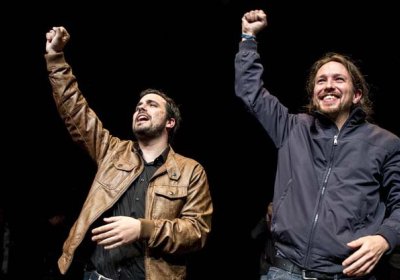The struggle in Catalonia for self determination has shaken the whole Spanish state. It has forced all political forces to take a stance.
Much of the left across the Spanish state, while not supporting the repression of the right-wing government of Prime Minister Mariano Rajoy, have also not supported Catalonia’s independence process.



 United We Can.
United We Can — the united ticket made up of Podemos, the United Left, the green party Equo and three broader alliances in Catalonia, Galicia and the Valencian Country — is campaigning in the June 26 Spanish general elections on a plan to reverse economic austerity.
United We Can.
United We Can — the united ticket made up of Podemos, the United Left, the green party Equo and three broader alliances in Catalonia, Galicia and the Valencian Country — is campaigning in the June 26 Spanish general elections on a plan to reverse economic austerity.



 Podemos activists
The December 20 elections in the Spanish state will attract the usual large field of runners. Challengers will represent every imaginable position along the Spanish state's two main political dimensions — the left-to-right social axis and the axis of national rights.
This second dimension reaches from the centralism of the ruling People's Party (PP) to the pro-independence stance of various Catalan, Basque and Galician parties.
Podemos activists
The December 20 elections in the Spanish state will attract the usual large field of runners. Challengers will represent every imaginable position along the Spanish state's two main political dimensions — the left-to-right social axis and the axis of national rights.
This second dimension reaches from the centralism of the ruling People's Party (PP) to the pro-independence stance of various Catalan, Basque and Galician parties.

